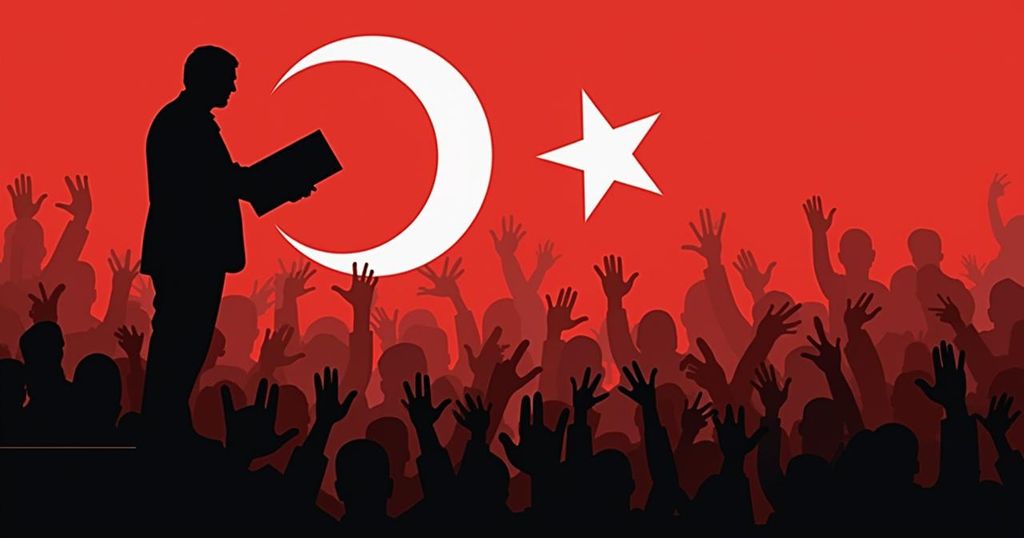Tunisia Votes in Presidential Election Amid Repression and Disillusionment
Tunisia’s presidential election features incumbent Kais Saied, who is expected to win amid repression and the exclusion of fourteen candidates. Public apathy characterizes the electorate, with significant critics jailed and the political situation marked by economic hardship. The election is seen as a culmination of three years of Saied’s authoritarian rule, amidst calls for greater voter participation despite low enthusiasm.
Tunisia has commenced its presidential election amid widespread repression, with the incumbent, Kais Saied, poised to secure another term. The electoral landscape features only two opposition candidates: a former lawmaker who previously endorsed Saied’s controversial power consolidation in 2021, and a businessman currently imprisoned on charges related to his candidacy. The Tunisian election authority has disqualified fourteen potential contenders from participation, which has intensified a crackdown on political dissent leading up to the elections. As Tunisia approaches three years since Saied’s decisive power grab, this election is perceived as a conclusion to the nation’s experiment with democracy, following its emergence as the birthplace of the Arab Spring uprisings against dictatorship. Polling stations are scheduled to operate from 8:00 AM to 6:00 PM (local time), with preliminary results anticipated shortly after the close of polls. The lead-up to the election has been marked by the absence of campaigning and public discourse, with campaign materials predominantly featuring images of Saied. The public mood has been characterized by apathy, particularly among the youth. “We have nothing to do with politics,” stated a young voter, exemplifying the sentiment of disillusionment pervading the electorate. Saied ascended to power in 2019 but subsequently orchestrated a power grab, amending the constitution and fostering an environment of increased repression against dissent. Human Rights Watch reports that over 170 individuals are currently detained in Tunisia for political reasons or for exercising their fundamental rights. Key opposition figures, including Rached Ghannouchi, the leader of the prominent opposition party Ennahdha, and Abir Moussi, head of the Free Destourian Party, are among those incarcerated. While approximately 9.7 million citizens are projected to participate in the election, the prevailing economic crises and the inevitability of Saied’s victory contribute to a lack of enthusiasm among voters. The International Crisis Group has noted that his nationalistic rhetoric, coupled with economic difficulties, has undermined public interest in the electoral process. The two candidates opposing Saied are Zouhair Maghzaoui, who endorsed Saied’s earlier power consolidation, and Ayachi Zammel, who faces legal charges related to his candidacy and has been detained since the validation of his candidacy by the election authority. In a recent address, Saied urged for a substantial voter turnout as he proclaimed a new phase of “reconstruction” while alleging a systematic fight against foreign conspiracies that he claims threaten his government. Despite some support from the working classes, his administration has come under scrutiny for failing to address Tunisia’s profound economic challenges.
The present article discusses Tunisia’s presidential election, which is taking place against a backdrop of repression and limited electoral choices. Following the Arab Spring, Tunisia had symbolized a hopeful transition to democracy. However, the recent political climate under President Kais Saied—who came to power in 2019 and subsequently executed a controversial power grab—has dwindled prospects for genuine political competition. The article outlines how the election process has been marred by the barring of numerous candidates, the arrest of key opposition figures, and a general sense of public disillusionment, particularly among the youth in the face of severe economic struggles.
In conclusion, Tunisia’s presidential election signifies a troubling moment in the nation’s democratic journey. With the incumbent poised for re-election against a backdrop of repression and the restriction of legitimate opposition, the election reflects a profound disconnection between the government and its people. The widespread resignation among the electorate, particularly in light of ongoing economic hardships, intertwines with the diminishing hope for political reform and accountability in Tunisia.
Original Source: www.france24.com




Post Comment